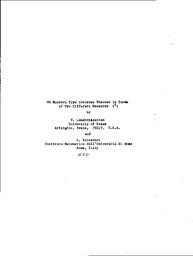| dc.description.abstract | **Please note that the full text is embargoed** ABSTRACT: The importance of uniform asymptotic stability in studying the stability properties of perturbed motions needs no emphasis. The converse theorem of Massera which results from uniform asymptotic stability has been widely used in perturbation theory (See [1,2,0]).Very recently [31 this powerful theorem has been fruitfully employed to investigate bifurcation problems and seems to have much future in that direction.
The advantage of studying stability properties by means of two different measures, as given by Movehan [41 , is well-known (See also [2,51 ). However, there does not exist a converse theorem of Massera type when uniform asymptotic stability holds in terms of two different measures. This is perhaps because the interplay between two measures gives rise to complications and hence it is not possible to construct
a smooth Lyapunov function unless we pay a price. Fortunately, as it will be seen in Sec.2, the price we have to pay to overcome the difficulties is reasonable. To show the application potential of our result, we are content with only giving (Sec.3) an application to total stability in this setup. | en |

